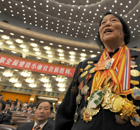Government and Policy
Is your Chinese hao bu hao?
By Chen Jia (China Daily)
Updated: 2010-04-28 07:49
 |
Large Medium Small |
New assessment will help promote Chinese language among foreigners
BEIJING - A new test to assess the ability of foreigners to speak Chinese will be introduced as part of efforts to promote the language.
| ||||
"The trial tests we conducted in Tianjin and Shanghai last year attracted about 5,000 foreigners," he said.
He expected a huge demand for the test as an increasing number of foreigners are able to speak fluent Chinese.
Known as HKC (hanyu kouyu ceshi), the computer-based test will be held twice a year, in June and December, in Beijing, Shanghai, Tianjin and Chongqing municipalities, Shandong, Fujian, Jiangsu and Hubei provinces and the Guangxi Zhuang autonomous region.
The HKC test will help universities and companies assess students' and employees' language-speaking proficiency, as the more common HSK test cannot assess those who read and understand Chinese but cannot speak it, Zhao said.
The HSK test, also known as the Chinese Proficiency Test, was introduced in 1990 and is China's standardized test to assess the Chinese proficiency of non-native speakers. It focuses on foreigners' writing, reading and listening abilities.
"About 60 to 70 percent of foreigners need to speak Chinese, rather than read and write, when they stay and work in China," he said.
HKC is the standard referenced test based on actual needs to communicate. The test integrates Chinese culture and focuses on practical daily situations.
It is divided into three levels in accordance with the three levels of the HSK.
The new test will complement the HSK, said Wang Dengfeng, deputy director of the National Chinese Language Commission.
Wei Jiaxiang, vice-minister of education in Malaysia, took the HKC test last May in Tianjin.
"He told me he felt the HKC is a professional and practical test," Zhao recalled.
Malaysia's capital, Kuala Lumpur, also hosted the pilot test.
The HKC test will be held in more places in and outside China in the future, Zhao said.
He also revealed the commission is planning to launch four overseas pilot projects in Asia and Europe.
China Daily











